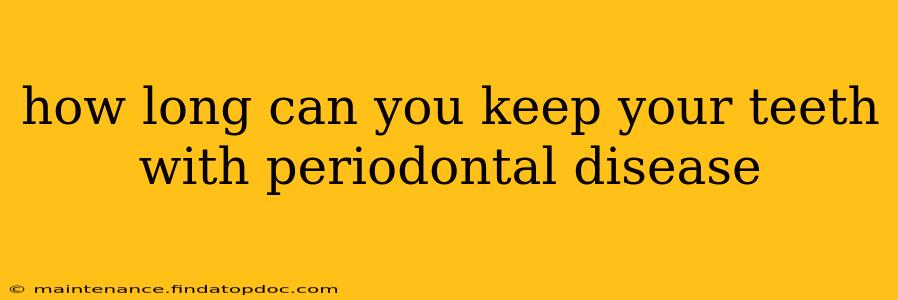Periodontal disease, also known as gum disease, is a serious infection that affects the tissues supporting your teeth. If left untreated, it can lead to tooth loss. However, the question of "how long" you can keep your teeth with periodontal disease is complex and depends heavily on several factors. There's no single answer, but understanding these factors can help you make informed decisions about your oral health.
What is Periodontal Disease?
Periodontal disease is an infection of the gums and bone that hold your teeth in place. It starts with gingivitis, an inflammation of the gums, often characterized by redness, swelling, and bleeding. If gingivitis isn't treated, it can progress to periodontitis, a more severe form that damages the bone and connective tissues, ultimately leading to tooth loss.
Factors Affecting How Long You Can Keep Your Teeth with Periodontal Disease:
Several factors influence the progression of periodontal disease and its impact on the longevity of your teeth:
1. Severity of the Disease:
The stage of periodontal disease at diagnosis significantly impacts its prognosis. Mild gingivitis is often reversible with improved oral hygiene, while advanced periodontitis requires extensive treatment and may still result in tooth loss.
2. Individual Response to Treatment:
Each person's immune system responds differently to periodontal disease and treatment. Some individuals respond well to treatment and experience minimal further progression, while others may experience more rapid disease advancement despite treatment.
3. Adherence to Treatment Plan:
Consistent adherence to a prescribed treatment plan is crucial. This includes regular professional cleanings, meticulous at-home oral hygiene, and possibly medication or surgical procedures. Failure to follow the recommended regimen can significantly increase the risk of tooth loss.
4. Overall Health:
Underlying health conditions like diabetes, smoking, and stress can negatively impact periodontal health and slow down healing. Managing these conditions is essential for effective periodontal treatment.
5. Access to Quality Dental Care:
Regular check-ups and prompt treatment from a qualified periodontist are essential for managing periodontal disease effectively. Early detection and intervention significantly improve the chances of retaining teeth.
How Can I Protect My Teeth from Periodontal Disease?
- Maintain Excellent Oral Hygiene: Brush twice daily with fluoride toothpaste and floss daily to remove plaque and food particles.
- Regular Dental Checkups: Schedule professional cleanings and examinations at least twice a year.
- Quit Smoking: Smoking significantly increases the risk of periodontal disease and impairs healing.
- Manage Underlying Health Conditions: Control conditions like diabetes that can exacerbate periodontal disease.
- Eat a Healthy Diet: A balanced diet rich in fruits, vegetables, and whole grains supports overall health, including oral health.
What are the Treatment Options for Periodontal Disease?
Treatment for periodontal disease varies depending on the severity. Options may include:
- Scaling and root planing: A deep cleaning procedure to remove plaque and tartar from below the gum line.
- Antibiotics: May be prescribed to combat infection.
- Surgical procedures: In advanced cases, surgery may be necessary to regenerate bone and tissues.
Can Periodontal Disease Be Reversed?
While advanced periodontitis can't be completely reversed, its progression can be halted, and significant improvement in gum health is possible with proper treatment and diligent home care. The goal is to prevent further bone loss and preserve as many teeth as possible.
How Long Can I Expect to Keep My Teeth with Periodontal Disease? (Revisited)
It's impossible to give a definitive timeframe. With early diagnosis, diligent treatment, and consistent home care, many individuals with periodontal disease can maintain their natural teeth for many years. However, in severe cases, despite optimal treatment, tooth loss may still occur. Regular professional care and a proactive approach to oral health are essential to maximizing the chances of preserving your teeth. Open communication with your dentist is crucial in understanding your individual prognosis and treatment plan.
